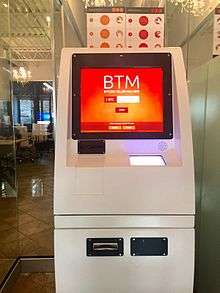Bitcoin ATM

A bitcoin ATM is an internet machine that allows a person to exchange bitcoins and cash. Some Bitcoin ATMs offer bi-directional functionality; these machines enable both the purchase of Bitcoin as well as the redemption of Bitcoin for cash. In some cases, Bitcoin ATM providers require users to have an existing account in order to transact on the machine.
Bitcoin machines are not ATMs in the traditional sense and probably use the wording ATM as a neologism. Bitcoin kiosks are machines which are connected to the Internet, allowing the insertion of cash in exchange for bitcoins given as a paper receipt or by moving money to a public key on the blockchain. They look like traditional ATMs, but Bitcoin kiosks do not connect to a bank account and instead connect the user directly to a Bitcoin exchange. According to an advisory issued by the Consumer Financial Protection Bureau, "they may also charge high transaction fees – media reports describe transaction fees as high as 7% and exchange rates $50 over rates you could get elsewhere".[1]:3
History
On October 29, 2013, a Robocoin machine opened in the Waves coffee shop in downtown Vancouver, Canada.[2] This machine is understood to be the world's first publicly available bitcoin machine. Robocoin ceased operations in January 2016.[3] Some Robocoin machines have since then been converted to run other software.[4] The first machine in the United States went online on February 18, 2014, in a cigar bar in Albuquerque, New Mexico.[5] It was removed 30 days later.[6] In late 2013, The D Casino install the first Bitcoin ATM in a casino in Las Vegas. [7] A New Zealand bitcoin machine operator announced in 2014 they had to shut-down operations due to interference with banks.[8] In 2014 a former Robocoin operator in the UK hacked its bitcoin ATMs to run on software from rival manufacturer Lamassu.[9]
Canada
Bitcoin machines are not yet regulated in Canada, however regulations have been officially proposed for all bitcoin exchangers.[10] In February, 2014, the Canadian Finance Minister mentioned plans to introduce anti-money laundering and anti-terrorist financing regulations for virtual currencies such as Bitcoin.[11]
Compliance
Bitcoin ATM operators need to adjust the limits on deposits and withdrawals according to AML/KYC standards applicable in the jurisdiction where their ATM's are placed. [12][13] In some countries / states this requires a money transmitter license.
See also
References
- ↑ "Risks to consumers posed by virtual currencies" (PDF). Consumer Financial Protection Bureau. August 2014. Retrieved 9 July 2016.
- ↑ Wagner, Kurt. "World's First Bitcoin ATM Opens In Vancouver, Canada". Mashable. Retrieved 9 February 2014.
- ↑ Higgins, Stan. "Former ATM Maker Robocoin Ends Bitcoin Services". CoinDesk. Retrieved 15 January 2016.
- ↑ Rizzo, Pete. "Robocoin Policy Change Ignites Fears Over Centralisation". CoinDesk. Retrieved 8 November 2014.
- ↑ Brodkin, Jon. "Bitcoin ATM goes live in Albuquerque, more coming to Austin and Seattle". Ars Technica. Ars Technica. Retrieved 19 February 2014.
- ↑ "Bitcoin ATM yanked after brief debut". CNET.
- ↑ Matt Villano. "Why Bitcoin Is Poised To Win Big In Las Vegas | Fast Company | Business + Innovation". Fast Company. Retrieved 2016-11-22.
- ↑ "New Zealand Bitcoin ATM Operator Runs into Issues With Banks, Shuts Down". Newsbtc.com. 2014-07-28. Retrieved 2016-11-22.
- ↑ "Robocoin Operator Hacks ATM to Run Lamassu Software". Coindesk.com. 2014-11-28. Retrieved 2016-11-22.
- ↑ "FINTRAC Advisory regarding Money Services Businesses dealing in virtual currency". Fintrac-canafe.gc.ca. Retrieved 2016-11-22.
- ↑ "Bitcoin Survey". Loc.gov. Retrieved 2016-11-22.
- ↑ "Bitcoin Law: What US businesses need to know". CoinDesk.com. 2013-08-17. Retrieved 2016-11-22.
- ↑ "What You Need to Know about Bitcoin ATM Regulation - Bitcoin ATM - Coinoutlet". Coinoutletatm.com. Retrieved 2016-11-22.
External links
![]() Media related to Bitcoin ATMs at Wikimedia Commons
Media related to Bitcoin ATMs at Wikimedia Commons
